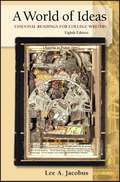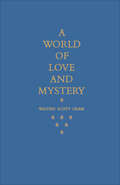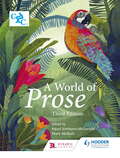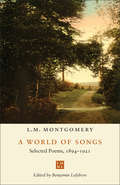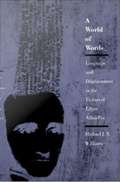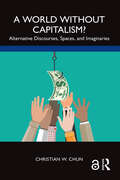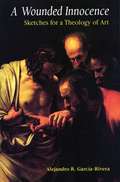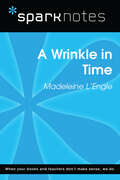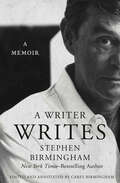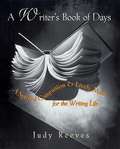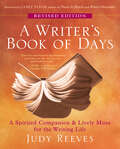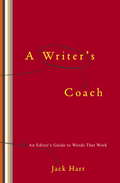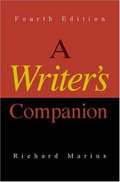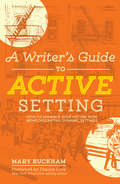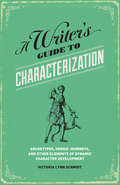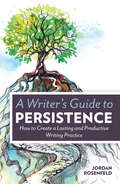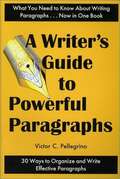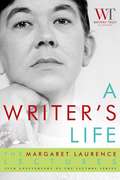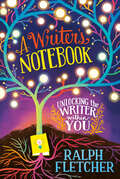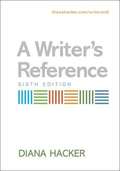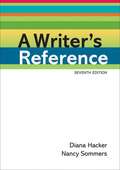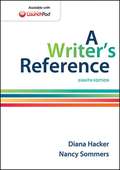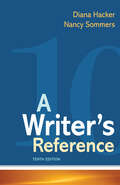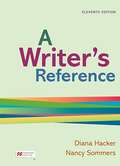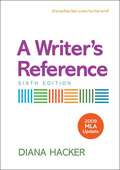- Table View
- List View
A World of Ideas: Essential Readings for College Writers
by Lee A. JacobusThe most successful reader of its kind,A World of Ideas introduces first-year writing students to the thinkers and writers whose ideas have shaped civilization: for example, Niccolò Machiavelli on government, Elizabeth Cady Stanton on justice, and Sigmund Freud on the mind. Because students perceive these writers as important, they take the writing course seriously: they learn to read more attentively, think more critically, and write more effectively. No other composition reader offers a comparable collection of important readings along with the supportive apparatus students need to understand, analyze, and respond to them.
A World of Love and Mystery
by Walden Scott CramA World of Love and Mystery is a collection of poetry divided into three parts written by the poet Walden Scott Cram.
A World of Prose: Third Edition
by Hazel Simmons-McDonald Mark McWattInspire students to enjoy literature while helping them to prepare effectively for the CSEC® examination; ensure coverage of all prescribed poems for the revised CSEC® English A and English B syllabuses with an anthology that has been compiled with the approval of the Caribbean Examinations Council by Editors who have served as CSEC® English panel members.- Stimulate an interest in and enjoyment of literature with a wide range of themes and subjects, a balance of well-known texts from the past and more recent works, as well as stories from the Caribbean and the rest of the world.- Support understanding with notes on each text and questions to provoke discussion, and a useful checklist to help with literary analysis.- Consolidate learning with practical guidance on how to tackle examination questions including examples of model answers for reference.
A World of Songs: Selected Poems, 1894–1921 (The L.M. Montgomery Library)
by L. M. Montgomery Benjamin LefebvreCelebrated as a novelist and made famous by her novel Anne of Green Gables and its sequels, L.M. Montgomery (1874–1942) is far less known for also writing and publishing hundreds of poems over a period of half a century.Although this output included a chapbook and a full-length collection in which she presented herself primarily as a nature poet, most of her poems appeared in periodicals, including women’s magazines, farm papers, faith-based periodicals, daily and weekly newspapers, and magazines for children. As a shrewd businesswoman, she learned to find the balance between literary quality and commercial saleability and continued to publish poetry even though it paid less than short fiction. A World of Songs: Selected Poems, 1894–1921, the second volume in The L.M. Montgomery Library, gathers a selection of fifty poems originally published across a twenty-five-year period. Benjamin Lefebvre organizes this work within the context of Montgomery’s life and career, claiming her not only as a nature poet but also as the author of a wider range of "songs": of place, of memory, of lamentation, of war, of land and sea, of death, and of love. Many of these poems echo motifs that readers of Montgomery’s novels will recognize, and many more explore surprising perspectives through the use of male speakers. These poems offer today’s readers a new facet of the career of Canada’s most enduringly popular author.
A World of Words: Language and Displacement in the Fiction of Edgar Allan Poe
by Michael J. S. WilliamsA World of Words offers a new look at the degree to which language itself is a topic of Poe's texts. Stressing the ways his fiction reflects on the nature of its own signifying practices, Williams sheds new light on such issues as Poe's characterization of the relationship between author and reader as a struggle for authority, on his awareness of the displacement of an "authorial writing self" by a "self as it is written," and on his debunking of the redemptive properties of the romantic symbol.
A World without Capitalism?: Alternative Discourses, Spaces, and Imaginaries
by Christian W. ChunIn this book, Christian W. Chun examines the ways in which identities, discourses, and topographies of both capitalist and anti-capitalist imaginaries and realities are embodied in the everyday practices of people. A World without Capitalism? is a sociolinguistic ethnography that explores the heretofore limited research in applied linguistics and sociolinguistics on the discursive and materialized representations and enactments of capitalism. Engaging across disciplinary fields, including applied linguistics, ethnography, political economy, philosophy, and cultural studies, Chun investigates in ethnographic detail how capitalism does and does not pervade people’s everyday experiences. This book aims to further contribute to a much-needed understanding of how discourses operate in the co-constructions of capitalist and anti-capitalist imaginaries and instantiated realities and practices as narrated, lived, and embodied by people and material artifacts. This book is vital reading for students and researchers working in the fields of applied linguistics, discourse analysis, and cultural studies, as well as those interested in understanding capitalism and questioning how to live beyond it.
A Wounded Innocence: Sketches For A Theology Of Art
by Alejandro R. Garcia-RiveraWhat is the theological significance of art? Why has the Church always encouraged the arts? What is so profoundly human about the arts? In A Wounded InnocenceAlejandro R. Garcia-Rivera answers these questions in a series of sketches" that are mixed spiritual and theological reflections on various works of art written in a poetic style. These reflections explore the relationship between the multi-dimensional spiritual and the arts. <P><P> The first *sketch, - *The Beginning of Art, - introduces the rest that go on to explore further the human, artistic, and theological implications of a wounded innocence. Each *sketch - reflects on a particular human work of art. Some are conventional works of art. Others may never find their way into a museum but, then, that is one of the implications coming out of this book. A museum does not define what a work of art is, its human depth does. In these deeply studied yet spiritually written reflections on each work of art, it is hoped that the reader will find his and her own creative depth described, perhaps even revealed. <P><P> A Wounded Innocenceis both inspiring and informative. Readers will learn about art, spirituality, and theology, and will find themselves inspired to look at works of art, and even to produce a work of art. It sets a new way of doing theology that is at the same time spiritual. More importantly, Garcia-Rivera describes a theology of art. <P><P> Chapters are *The Beginning of Art, - *The End of Art, - *Human Freedom and Artistic Creativity, - *Heaven-with-Us, - *The Human Aspect of Atonement, - *The Tyger and the Lamb, - and *A Wounded Innocence. - Includes black and white art. <P><P> Alejandro R. Garcia-Rivera, PhD, is associate professor of systematic theology at the Jesuit School of Theology at Berkeley. The author of numerous articles, he also wrote a Catholic Press Association award-winning book on theology and aesthetics titled The Community of the Beautiful(The Liturgical Press).
A Wrinkle in Time (SparkNotes Literature Guide Series)
by SparkNotesA Wrinkle in Time (SparkNotes Literature Guide) by Madeleine L'Engle Making the reading experience fun! Created by Harvard students for students everywhere, SparkNotes is a new breed of study guide: smarter, better, faster. Geared to what today's students need to know, SparkNotes provides: *Chapter-by-chapter analysis *Explanations of key themes, motifs, and symbols *A review quiz and essay topicsLively and accessible, these guides are perfect for late-night studying and writing papers
A Writer Writes: A Memoir
by Stephen BirminghamA memoir by the New York Times–bestselling author and longtime chronicler of America&’s wealthy elite. Born in Connecticut in 1929 and educated at Williams College, Stephen Birmingham went on to create a literary niche with his numerous nonfiction works about New York&’s—and the nation&’s—upper class, particularly focusing on Jewish, African American, and Irish communities, as well as old-money WASPs. He also drew on his &“intimate knowledge of the private lives of the rich and famous&” to write bestselling works of fiction such as The Auerbach Will (The New York Times Book Review). In this book, Birmingham&’s attention is turned to his own life, both personal and professional, allowing us to learn about the man who created such compelling portraits of glittering parties, exclusive addresses, and, in some cases, rags-to-riches sagas that epitomize the American dream—and the American struggle. In the end, his story is as fascinating as those of the aristocrats he documented. &“When it comes to the folkways of the rich, the powerful, and the privileged, Stephen Birmingham knows what he&’s talking about.&” —Los Angeles Times
A Writer's Book of Days
by Judy Reeves"A Writer's Book of Days is a holistic approach to being a writer that encompasses the physical, emotional, and spiritual as well as the creative aspects of writing." The book includes daily writing prompts, quotes from writers about writing, and habits of established writers as well as other suggestions for becoming a write. Some comma faults, other punctuation faults like possessives, and some grammatical errors are in the book itself and were not changed.
A Writer's Book of Days: A Spirited Companion and Lively Muse for the Writing Life
by Judy ReevesFirst published a decade ago, A Writer's Book of Days has become the ideal writing coach for thousands of writers. Newly revised, with new prompts, up-to-date Web resources, and more useful information than ever, this invaluable guide offers something for everyone looking to put pen to paper — a treasure trove of practical suggestions, expert advice, and powerful inspiration. Judy Reeves meets you wherever you may be on a given day with: • get-going prompts and exercises • insight into writing blocks • tips and techniques for finding time and creating space • ways to find images and inspiration • advice on working in writing groups • suggestions, quips, and trivia from accomplished practitioners Reeves's holistic approach addresses every aspect of what makes creativity possible (and joyful) — the physical, emotional, and spiritual. And like a smart, empathetic inner mentor, she will help you make every day a writing day.
A Writer's Coach
by Jack HartMystified over misplaced modifiers? In a trance from intransitive verbs? Paralyzed from using the passive voice? To aid writers, from beginners to professionals, legendary writing coach Jack Hart presents a comprehensive, practical, step-by-step approach to the writing process. He shares his techniques for composing and sustaining powerful writing and demonstrates how to overcome the most common obstacles such as procrastination, writer’s block, and excessive polishing. With instructive examples and excerpts from outstanding writing to provide inspiration,A Writer’s Coachis a boon to writers, editors, teachers, and students.
A Writer's Companion (4th Edition)
by Richard MariusThis brief guide to writing the essay and writing across the curriculum is indeed true to its title. It offers excellent advice on developing and polishing prose, with an emphasis on style and process--all with wit, charm, and intelligence.
A Writer's Guide to Active Setting: How to Enhance Your Fiction with More Descriptive, Dynamic Settings
by Dianna Love Mary BuckhamEnhance Your Fiction with the Power of an Active Setting!Setting is one of the most underutilized and misunderstood elements of the writing craft. And when writers do focus on setting, they often pull readers out of the narrative and jolt their attention from the action on the page.A Writer's Guide to Active Setting will show you how to create vivid, detailed settings that bring your story to life. You'll learn how to deepen character development, anchor readers to a specific time and place, reveal backstory without slowing things down, elevate action sequences, and more.Drawing upon examples from authors writing across a variety of genres, Mary Buckham will illustrate exactly how the proper use of setting can dramatically improve your story. You'll learn what's effective about each passage and how you can use those techniques to make your story shine."Takes an all too often overlooked technique, and elevates it to a next-level game changer for powerful fiction." --Cathy Yardley, author of Rock Your Plot"A powerful combination of fresh insights, practical examples, and how-to advice on the often overlooked but critical element of setting...written in a quick-to-read and easy-to-understand style, and packed with useful application exercises." --Kelly L. Stone, author of Thinking Write: The Secret to Freeing Your Creative Mind"If you're a writer, then Mary Buckham's book is a must-have tool for your writer's toolkit. Creating settings that are rich and believable is not an easy task, but with this book, I found that each chapter gave me great tips that I could immediately implement in my manuscript." --Laurie G. Adams, author of Finding Atticus
A Writer's Guide to Characterization: Archetypes, Heroic Journeys, and Other Elements of Dynamic Character Development
by Victoria Lynn SchmidtDevelop compelling character arcs using the power of myth! In the best novels, characters undergo dramatic changes that keep readers turning pages. A Writer's Guide to Characterizationshows you how to develop such meaningful character arcs in your own work--stories of transformation that will resonate with readers long after the story ends. In this comprehensive guide, author Victoria Lynn Schmidt examines cross-cultural archetypes to illustrate how they can make your work more powerful and compelling. Plus, you'll learn how to draw from Jungian psychology to add complexity and believability to your characters. Schmidt also provides: 40 lessons on character development (with examples from well-known films and novels) that you can apply to your own work Questionnaires and exercises to help you select male and female archetypes and adapt them to your story 15 classic animal archetypes (including the coyote, snake, tiger, and butterfly) you can use to build convincing character profiles WithA Writer's Guide to Characterization, you'll have the information you need to infuse the development of your characters with drama and authenticity.
A Writer's Guide to Persistence: How to Create a Lasting and Productive Writing Practice
by Jordan RosenfeldPractice. Polish. Persist. Your writing journey can take you many places: hiking through steep mountains, traversing unknown territory, hurdling both roadblocks and rejections. Even the siren song of fame and fortune can distract you from your true purpose: to express yourself in an authentic and meaningful way, and to share your words with others. A Writer's Guide to Persistence is your road map through the rugged terrain of the writer's path. You'll discover advice and techniques for cultivating a fruitful, deeply meaningful writing life by practicing your craft, polishing your work, and persisting through even the toughest challenges. Inside you'll find: Practical ways to balance writing with the rest of your life: taming your busy schedule, increasing your productivity, and committing to a writing practice Advice for developing authentic work: finding your voice, writing bravely, and breaking the blocks to creative flow Methods for stretching your skills through craft and revision Thoughts on pushing through rejection and doubt, submitting strong, nourishing yourself to avoid burnout, and keeping your mind and body fit Filled with journaling exercises and much-needed motivation, as well as insights from best-selling writers in a variety of genres, A Writer's Guide to Persistence will help you find the joy and purpose inherent in a writer's life. Your journey to publication and success may take a lifetime, but you can sow the rewards of writing with every step. "A compassionate and intelligent guide for any writer who's just starting out or one who needs the understanding and encouragement of a great writing coach. Rosenfeld offers practical solutions for every concern, from how to find the time to write to getting through writer's block." --Patricia V. Davis, best-selling author
A Writer's Guide to Powerful Paragraphs
by Victor Pellegrino Christopher MageeA Writer s Guide To Powerful Paragraphs is a straightforward, easy-to-understand guide to improving the quality of writing, one paragraph at a time. Aspiring writers are provided with thirty different but effective ways to organize and write competent paragraphs.
A Writer's Life: The Margaret Laurence Lectures
by The Writers' Trust of CanadaFor anyone who loves great literature -- or aspires to write it -- this is an essential collection, full of insight, wisdom, humour, and candour from Canada's most important and beloved literary figures. For the past twenty-five years, the Writers' Trust of Canada's annual lecture series, the Margaret Laurence Memorial Lecture, has invited some of Canada's most prominent authors to discuss the theme of "A Writer's Life" in front of their peers. Hugh MacLennan, Mavis Gallant, Timothy Findley, W. O. Mitchell, Pierre Berton, P. K. Page, Dorothy Livesay, Alistair MacLeod, and Margaret Atwood, among others, have shared the personal challenges they faced in forging their own paths as writers, at a time when such a career was still unusual in this country. Intimate, frank, and revealing in tone, their lectures -- collected for the first time in celebration of the series' twenty-fifth anniversary -- provide a unique account of a period when a national writing community was just being formed, and give us unprecedented access to the heroes and heroines of Canadian literature as they share their insights into their work, the profession of writing, the growing canon of our literature, and the cultural history of our country.
A Writer's Notebook: Unlocking the Writer Within You
by Ralph FletcherWriters are like other people, except for at least one important difference. Other people have daily thoughts and feelings, notice this sky or that smell, but they don't do much about it. Not writers. Writers react. And writers need a place to record those reactions. That's what a writer's notebook is for. It gives you a place to write down what makes you angry or sad or amazed, to write down what you noticed and don't want to forget . . . .
A Writer's Reference
by Diana Hacker Nancy Sommers Tom Jehn Jane RosenzweigHaving helped nearly 3 million students at 1,600 colleges and universities to write well,A Writer's Referencesucceeds because it has always been grounded in classroom experience. Nearly twenty years ago, Diana Hacker reinvented the college handbook by looking at her own students' needs. She crafted a first-of-its-kind reference that offered practical solutions to college writing problems in a language students could understand and in a format that was easy for them to use. Her many innovations -- hand-edited sentences, grammar checker boxes, student-friendly index entries, ESL coverage, and a lay-flat comb binding -- have been widely imitated but never improved upon. In the Hacker tradition, the new contributing authors -- Nancy Sommers, Tom Jehn, Jane Rosenzweig, and Marcy Carbajal Van Horn -- have crafted solutions for the writing problems of today's college students. Together they give us a new edition that provides more help with academic writing and that works better for a wider range of multilingual students.
A Writer's Reference
by Diana Hacker Nancy SommersA Writer's Reference, the most widely adopted handbook in the United States, continues to be groundbreaking in its simplicity, offering the right content in an accessible format. New coauthor Nancy Sommers's own research, campus travel, and classroom experience keep the handbook in tune with the needs of academic writers. In a trusted quick-reference format, the seventh edition delivers advice on all the right topics: working with sources, revising with comments, preparing a portfolio, and more. A Writer's Reference offers unprecedented flexibility with several versions to choose from -- a handbook that's truly at your service. Read the preface.
A Writer's Reference
by Diana Hacker Nancy SommersFor success in college, no skill is more critical than writing; it's the very core of a student's academic experience. Tested and trusted, A Writer's Reference is an essential tool for students who are strengthening habits and skills that will support them throughout college. In an April 2014 survey of first-year writers, 75 percent reported that using a Hacker handbook made them a more confident academic writer. What's more, A Writer's Reference has been a powerful tool for change across college campuses--helping to create a culture of writing at many schools by supporting a common language for talking about academic writing. In that way, A Writer's Reference is uniquely positioned to help transform attitudes about the value of writing instruction and the role that writing plays in academic work and in higher learning. With this eighth edition of the handbook, author Nancy Sommers invites you to be part of a community of those who teach and assign writing; who believe that critical reading, analytical writing, responsible research, and clarity are at the center of effective writing across the academy; and who use the nation's best-selling and most responsive handbook to support the development of the college writer.
A Writer's Reference
by Diana Hacker Nancy SommersEngage more. Achieve more.A Writer’s Reference helps you engage in and meet the challenges of your writing course. Clear How-to boxes help you complete common writing assignments like argument and analysis. Guidance about paraphrasing and fact-checking sources help you become a more responsible writer and reader. And Notes-to-self help you reflect on your progress and plan your revision. If your instructor has assigned Achieve, you have new ways to engage with course material and with your instructor and peers. Revision planning tools and individualized study plans help you become a better writer, and a built-in e-book puts your problem and your solution side by side.
A Writer's Reference
by Diana Hacker Nancy SommersA Writer’s Reference answers common writing questions, helps you accomplish college assignments with confidence, and gives you strategies for using AI tools responsibly to save time but still sound like you.
A Writer's Reference (6th Edition with 2009 MLA Update)
by Diana HackerRead this to find out more about the 2009 MLA updates and the 2010 APA updates. A Writer's Reference is the most widely adopted college handbook ever published. The new edition is available in a classic version that provides more help with academic writing, serves a wider range of multilingual students, and lends more support for college research -- all in an easy-to-use quick-reference format. Now for all the ways you teach your course, you can choose the classic version or choose from among 4 additional versions with varied content. A Writer's Reference with Exercises is tailor-made for classroom use or for additional grammar practice with 86 integrated exercise sets. A Writer's Reference with Writing in the Disciplines provides help for college writing beyond composition with advice and models in six academic disciplines. A Writer's Reference with Writing about Literature includes an entire tabbed section on interpreting and writing about works of literature, with two annotated student essays. A Writer's Reference with Extra Help for ESL Writers includes an entire tabbed section for nonnative speakers of English; it offers targeted advice and strategies for college writing and research.
